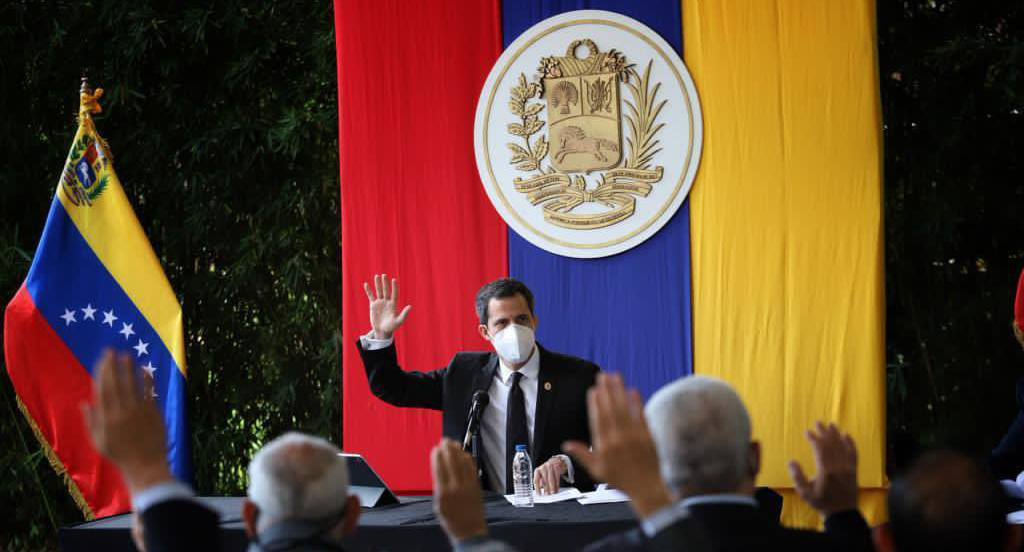
Spanish – The support base of the interim government of Juan Guaidó is beginning to waver. On Saturday, the so-called G-4 – made up of the four main opposition parties – Democratic Action (AD) begins to move away from the interim. While the rest of the parties – Justice First (PJ), Popular Will (VP), and A New Era (UNT) – approved a reform of the Transitional Statute, Democratic Action voted against it on Saturday, alleging that the current statute is sufficient for the exercise of continuity.
A Twitter thread published by the Justice First party details the most relevant aspects of this reform. The first objective is to promote both inside and outside the country the call for “free, fair, and verifiable presidential and parliamentary elections,” something that the interim government had been promising since its installation in February 2019.
As the PanAm Post exclusively announced, the National Assembly elected in 2015 will continue to exercise its functions through a Delegate Commission after January 5, 2021, when the Chavista National Assembly, not recognized by the opposition or by much of the international community, will be installed.
The approved text establishes that “the continuity of the National Assembly will be for an additional parliamentary period,” that is, “until January 5, 2022, or until there are free presidential elections, whichever is first.”
Additionally, a Political Council is designated to replace the Government Center as the collective body for coordination, follow-up, and evaluation of the actions of the Presidency in charge. The functions assigned to this council include the restructuring of the interim government to “make it more efficient” and to implement mechanisms that allow for greater “transparency in the management of public funds.”
Democratic Action maintains its distance
Democratic Action clarified that it continues to recognize Juan Guaidó as interim president but disagrees with the mechanism proposed for the extension of the mandate of the current National Assembly and therefore, the interim. Democratic Action proposes to keep the Parliament in full with its legislative and control function and not simply under the Delegate Commission, which has specific functions.
“This fraction believes that it is sufficient to maintain the validity of the statute, that with the legal and political tools that said legislation grants to this legitimate National Assembly, the continuity of the constitutional functions of our deputies and this Parliament is guaranteed,” the communiqué explains, also clarifying that due to the illegitimacy of the elections held by the regime on December 6, the current statute satisfies the functional expectations of this National Assembly since those who would replace it have not been constitutionally elected.
Para @ADemocratica, nuestros diputados, dirigentes y militantes la lucha democrática, apegada a la CRBV y en beneficio del pueblo, es lo más importante. Hoy @AD_DiputadosAN salva el voto en la Reforma al Estatuto de Transición y ratifica su respaldo a la AN legítima y @jguaido pic.twitter.com/Ivoj3XnsQT
— Secretaría de Organización Nacional AD (@organizacionAD) December 26, 2020
Another reason cited by Democratic Action for voting against the reform of the Transitional and Restructuring Statute of the Interim Government has to do with the creation of a Political Council: “We believe that the creation of a Political Council is unnecessary to exercise functions that could perfectly well be carried out by the National Assembly or the President in charge of the Republic.”
Other internal cracks
But it was not only the Democratic Action deputies who broke the unanimity. The parliamentarians of Justice First, who are part of the sector led by the former presidential candidate, Henrique Capriles, were absent from the virtual vote that the G-4 proposed as the key to guaranteeing continuity.
The Presidential Commissioner for Foreign Affairs of Venezuela, Julio Borges, said through a message in his Twitter account that he regretted that this reform had not been approved unanimously.
Hoy se aprobó el nuevo estatuto de la transición para continuar la lucha por la democracia en Venezuela. Trabajaremos su aplicación con la comunidad internacional, sin embargo, es muy grave que no haya sido votado unánimemente. https://t.co/MBxi5LVOlz
— Julio Borges (@JulioBorges) December 26, 2020
International uncertainty
Juan Guaidó has received the support of more than 60 countries that recognize his mandate as legitimate and not that of Nicolás Maduro. As of January, this may change. There is no consensus in the European Union to continue recognizing Guaidó as the president in charge. Countries such as Italy and Greece have questioned the continuity of the leader of the Popular Will Party. Consequently, the so-called group of 27 is considering making a statement rejecting the December 6 elections, but with nuances regarding Guaidó’s role as the country’s leader.
Another important support hanging by a thread is that of the United States. Under the administration of President Donald Trump, Guaidó had unconditional support. The Republican leader had guaranteed to extend recognition to Guaidó beyond January 5, but with Joe Biden in the White House, nothing is clear. The Democrat’s advisors have said that the president-elect will seek direct approaches with Nicolas Maduro, which could leave Guaidó out of the picture.
 Versión Español
Versión Español













